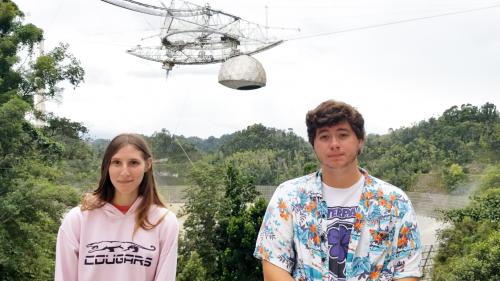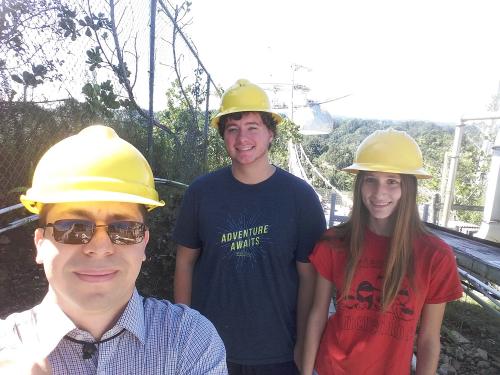University News
WIU Students Travel to Puerto Rico for Unique Academic Experience
October 31, 2019
MACOMB, IL – Two students from the Western Illinois University Department of Physics had a unique opportunity earlier this semester to travel to use one of the largest radio telescopes in the world, based at the Arecibo Observatory in Puerto Rico.
Jake Lambert, a physics graduate student, of Winthrop Harbor, IL, and Natalie Kovacevic, a junior undergraduate student from Plainfield IL, traveled to Puerto Rico in September with Associate Professor of Physics Esteban Araya.
The trip was made possible by a grant from the National Science Foundation to study the earliest phases of formation of massive stars. As a component of the grant, and in collaboration with an international group of scientists, Araya said he was able to schedule time with the telescope to investigate whether a simple molecule, CH, can trace outflows from very young massive stars.
The telescope the students used is the most sensitive available for the detection and study of molecules at ~3 GHz frequencies and they were in charge of operating the telescope, data acquisition and data reduction.
"The students had the opportunity to learn how to use one of the most important radio astronomy facilities," said Araya. "The students learned how to operate the telescope, obtain and reduce data and had special tours of the telescope where the theoretical topics discussed in their physics courses were exemplified. In addition, the students were able to interact with students on campus taking the PHYS311 Classical Mechanics class via Zoom, as well as with two high-school students who are doing a science project at the WIU Astrophysical Research Laboratory."
Lambert and Kovacevic explained to the high school students how to use the Arecibo Telescope in remote mode and then guided them in conducting observations remotely from WIU's Currens Hall.
"I had the most fun selecting the sources we were observing, saying 'ok, this is the next source we are going to see' and then actually getting to see the results of those detections and then 'yep, I picked that source,'" said Kovacevic. "One of the big learning experiences from this trip is using all the computer programs that go along with observing. There is the main computer program on how to move the telescope that I learned how to use and there are all the computer programs to look at and analyze data we got."
"A big learning experience is that if you want to go to the field of radio astronomy, you want to come to the telescope and see what your day-to-day work is going to be, where you come to observe, then go to your office, do a lot of data reduction, go to a talk. It is like a week trial of what this job is like," said Lambert.
After returning from Puerto Rico, Kovacevic is spending the semester analyzing the data that were collected. Kovacevic, who works in the WIU Astrophysics Lab, will present her research results from the trip at the Conference for Undergraduate Women in Physical Sciences at the University of Nebraska-Lincoln in November and at the Conference for Undergraduate Women in Physics at the University of Chicago in January.
The research opportunities provided at the WIU Astrophysics Research Laboratory are partially supported by the National Science Foundation grant AST-1814063, in collaboration with NSF grant AST-1814011, and computational resources donated by the WIU Distinguished Alumnus Frank Rodeffer.
For more information about WIU's Department of Physics, visit wiu.edu/physics.
Posted By: University Communications (U-Communications@wiu.edu)
Office of University Communications & Marketing



Connect with us: